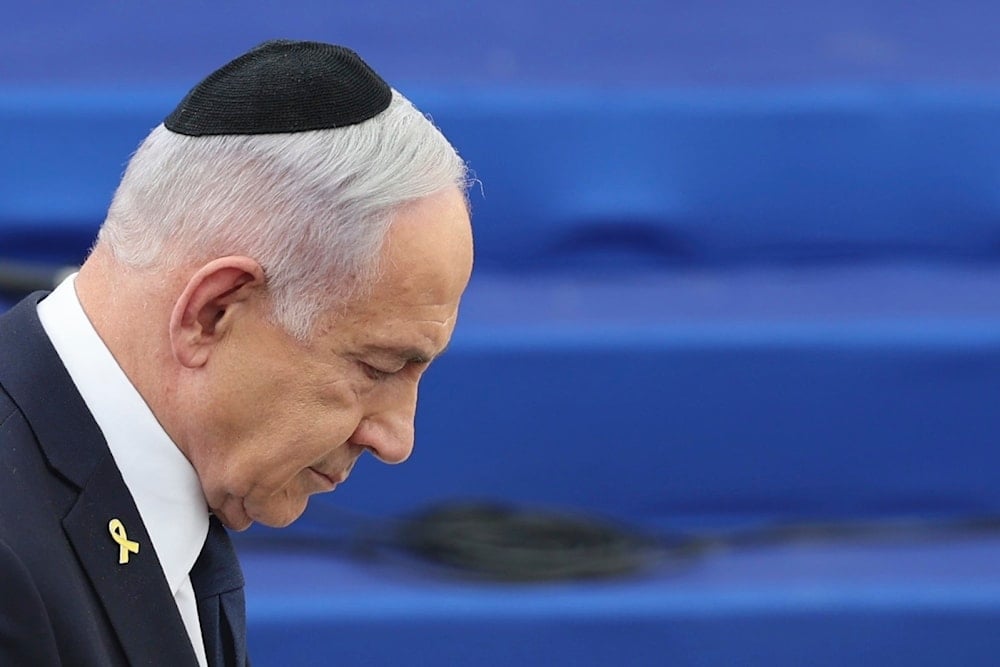Netanyahu refuses to budge, captive talks stall: Israeli officials
Netanyahu is under fire for refusing flexibility in prisoner exchange negotiations, stalling progress on a deal that has drawn frustration from within "Israel" and Washington alike.
-

Israeli Prime Minister Benjamin Netanyahu speaks during an annual ceremony in occupied al-Quds, occupied Palestine, April 29, 2025 (AP)
Israeli officials confirmed on Wednesday that Israeli Prime Minister Benjamin Netanyahu is refusing to show flexibility in negotiations to secure a captive exchange deal, leading to a stalemate that has been met with criticism from within "Israel" and Washington alike.
Israeli officials told multiple Israeli news outlets that the current talks aimed at securing a prisoner exchange deal have stalled, with no progress made, noting that Prime Minister Benjamin Netanyahu has "refused to budge on any changes to Witkoff’s proposal," in reference to US Middle East envoy Steve Witkoff.
Israeli news channel i24NEWS cited an Israeli official as saying that "Netanyahu and Israel continue to make it clear in the ongoing Doha talks that Witkoff’s proposal is the only viable path to a deal."
The Witkoff proposal, put forward about two months ago regarding Gaza, outlines a 45-day ceasefire and includes a series of preliminary steps toward a permanent cessation of hostilities; though it does not explicitly guarantee a permanent end to the war, instead banking on the success of the initial truce to pave the way for a second phase.
These statements came as Washington announced a deal in which Hamas released the last living American captive in Gaza, Edan Alexander, after over 18 months in captivity, a move that has drawn frustration from the Israeli side.
Following Alexander's release, the families of the remaining hostages expressed frustration over the government's delays, with their representative body sending a direct message to Prime Minister Benjamin Netanyahu questioning his commitment to the remaining captives and demanding concrete actions to demonstrate the Israeli government's commitment.
Netanyahu's bombs vs. Hamas' diplomacy
Hamas rebuked Israeli Prime Minister Benjamin Netanyahu’s assertion that military pressure played a role in freeing US-Israeli captive Edan Alexander and attributed it instead to "serious communications".
“The return of Edan Alexander is the result of serious communications with the US administration and the efforts of mediators, not a consequence of Israeli aggression or the illusion of military pressure,” the Palestinian Resistance group announced in a statement.
The Palestinian Resistance group asserted that Netanyahu is misleading the Israelis and has failed to free the Israeli captives through aggression, noting that the return of captive Edan Alexander proves that negotiations and a prisoner exchange deal are the only way for the return of the Israeli captives and to end the war.
On May 12, the al-Qassam Brigades, the military wing of Hamas, handed over Israeli soldier and American captive Edan Alexander to the International Committee of the Red Cross in northern Khan Younis, located in southern Gaza.
The release took place as US Special Envoy to the Middle East Steve Witkoff arrived at the Re'im military base, where Alexander was said to be transferred, while Israeli media reported that Alexander is scheduled to travel to Qatar on Wednesday for a meeting with US President Donald Trump.
The release of Alexander came after direct negotiations between the United States and Hamas, with mediation by Qatar and Egypt, as part of efforts to restart stalled ceasefire talks and facilitate the delivery of humanitarian aid to Gaza.

 3 Min Read
3 Min Read









